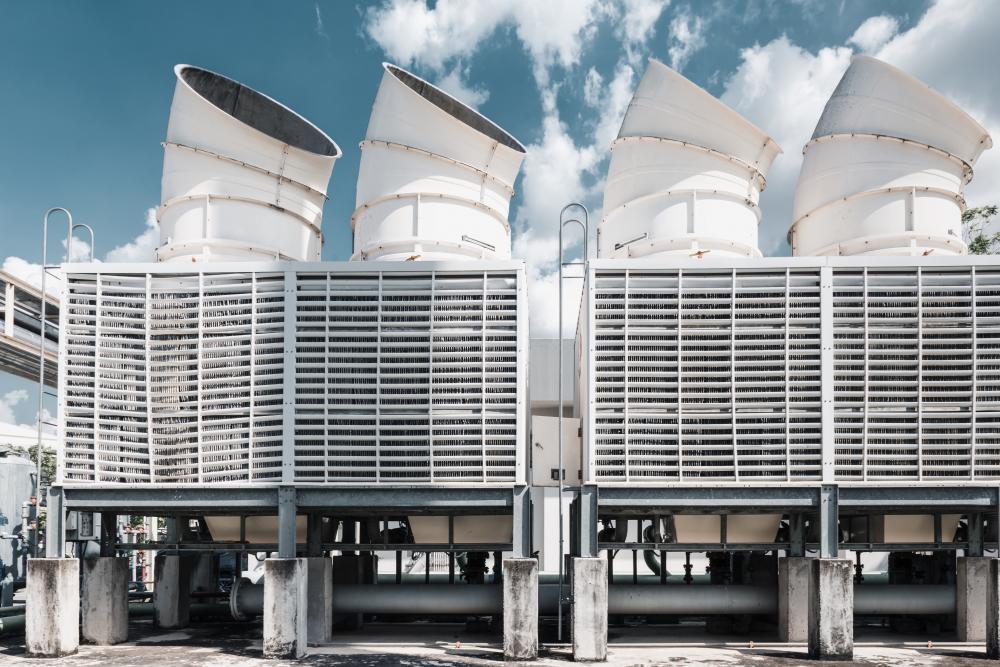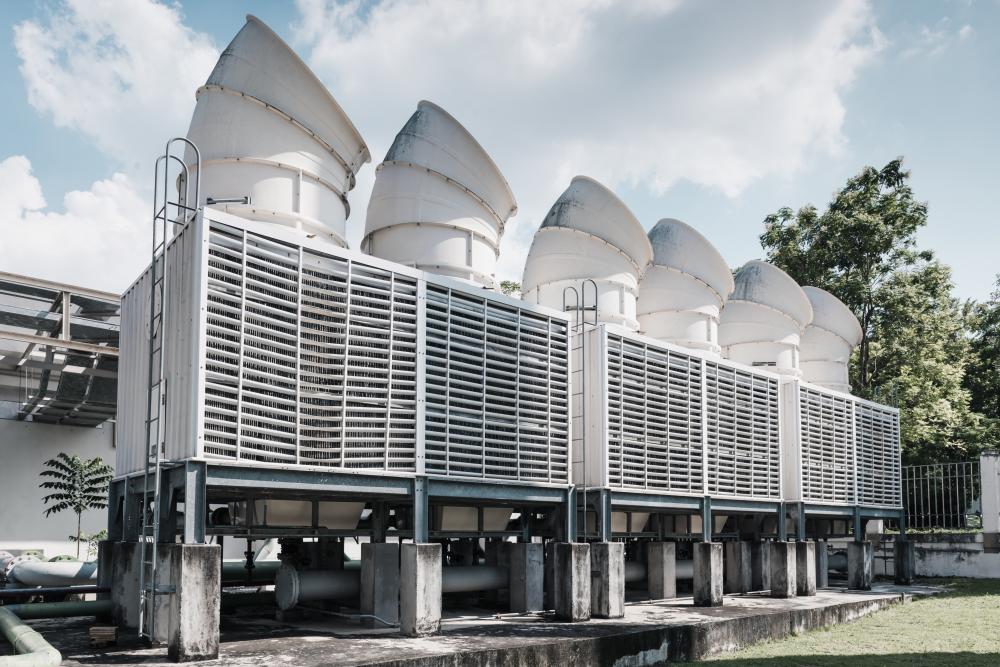
Understanding HVAC Chillers
At B.I.M.S., Inc., we have spent over four and a half decades perfecting the art and science of HVAC chillers. Our journey has been filled with countless installations, maintenance missions, and emergency repair operations across the Greater Texas Area. In this piece, we draw from that reservoir of experience to bring you an insider’s look into the world of HVAC chiller systems – their workings, benefits, and common issues encountered.
How HVAC Chillers Work
HVAC chillers are marvels of engineering designed to provide cooling for commercial and industrial spaces. They function by moving heat away from the interior environment, using either air or water. The process begins with the chilling unit drawing in warm air or water and removing its heat; this cooled medium is then circulated throughout the building to reduce temperatures.
Types of Chillers
There are principally two types of chillers: air-cooled and water-cooled. Each has its unique application and benefits. Air-cooled chillers are typically used in smaller facilities where space and water resources are limited, while water-cooled chillers are found in medium to large installations that can utilize a continuous water supply.
The Importance of Maintenance
Maintenance cannot be overstressed when it comes to HVAC chillers. These systems, complex as they are, demand regular check-ups to prevent corrosion, clogging, and inefficiency. Our team at B.I.M.S., Inc. has seen first-hand how a well-maintained chiller can significantly extend its lifespan and operate more efficiently, saving costs and reducing downtimes.
Preventative measures include regular cleaning, monitoring for leaks, and ensuring electrical components are in good working order. These steps help to avoid the common pitfalls that can lead to system failures.
Common Issues
Even with diligent maintenance, chillers can encounter problems. Corrosion and electrical issues are among the top concerns, resulting in performance degradation or complete system shutdowns. Our technicians have honed their skills in identifying and resolving such issues, often turning potential disasters into minor hiccups.
Corrosion Prevention
Corrosion is the bane of many a chiller system, mainly due to the constant presence of water. The right treatment of the water system and the use of compatible metals can mitigate this risk. Our approach includes comprehensive water treatment plans and regular inspections to catch and address any signs of corrosion early.
Electrical Maintenance
Chillers rely on their electrical systems to function smoothly. Power surges, grounding issues, and simple wear and tear can lead to failures. We emphasize the importance of electrical maintenance to prevent such issues from occurring. This includes routine checks of all electrical components and ensuring they are clean, secure, and undamaged.
Innovations in Chiller Technology
As part of our commitment to excellence, B.I.M.S., Inc. stays abreast of the latest advancements in chiller technology. This includes the adoption of more energy-efficient models and the integration of smart systems that allow for remote monitoring and control. These innovations not only improve performance but also contribute to environmental conservation efforts.
Choosing the Right Chiller
Selecting the appropriate HVAC chiller for your facility is crucial. The decision between an air-cooled and a water-cooled chiller hinges on several factors, including the size of your facility, available space, and water resources. Our team offers comprehensive consultations to help determine the best fit for your specific needs, ensuring optimal efficiency and cost-effectiveness.
B.I.M.S. Commitment
At B.I.M.S., Inc., our journey through the labyrinth of HVAC chillers has been long and fruitful. We’ve encountered every imaginable scenario and tackled challenges with both traditional and innovative solutions. Our dedication to providing exceptional service and support is unwavering.
Whether you’re facing a chiller emergency, contemplating a new installation, or simply seeking advice on maintenance, our doors are always open. Trust in our expertise, cultivated over 45 years, to guide you through the world of HVAC chillers. With B.I.M.S., Inc., you’re not just getting a service provider; you’re gaining a partner dedicated to your success.
- Comprehensive chiller services
- Expert maintenance tips
- Innovative solutions for common issues
- Guidance on selecting the right chiller
For all your HVAC chiller needs, count on the seasoned professionals at B.I.M.S., Inc. Let us help you maintain a cool, efficient, and reliable environment for your business.

What is a chiller in HVAC?
Imagine a hot summer day in Texas, where the air feels like a thick blanket. In these moments, the chiller in your HVAC system is your best friend. It’s essentially a refrigerator for your building, pulling heat from the interior air or water and expelling it outside. This process keeps your space cool and comfortable. At B.I.M.S., Inc., we’ve installed and maintained countless chillers, and we’ve seen firsthand the critical role they play in ensuring a pleasant environment in commercial and industrial spaces.
Is a chiller the same as an air conditioner?
While both chillers and air conditioners aim to cool spaces, the way they achieve this is quite different. Air conditioners directly cool the air inside a space by blowing it over cold coils, whereas chillers cool water or another medium, which is then used to cool the air indirectly. This distinction is critical in large facilities where distributing cooled air directly from a central unit would be inefficient. Chillers provide a versatile and efficient cooling solution, especially in large buildings or industrial settings.
What are the three basic types of chillers?
In the world of HVAC, chillers come in three main flavors: air-cooled, water-cooled, and evaporative condensing chillers. Air-cooled chillers expel heat into the air outside the building, making them suitable for smaller spaces where water resources are scarce. Water-cooled chillers, on the other hand, are more efficient for larger installations, using a continuous water supply to remove heat. Evaporative condensing chillers combine these approaches, using evaporated water to aid in the cooling of the condenser coils. Each type has its unique applications and benefits, depending on the specific needs of the facility.
Is a chiller the same as a condenser?
Although chillers and condensers are closely related in their functions, they are not the same. A chiller encompasses a compressor, evaporator, condenser, and other components to remove heat from a liquid via a vapor-compression or absorption refrigeration cycle. The condenser is just one part of this system, responsible for expelling heat absorbed by the refrigerant from the evaporator. In a nutshell, the chiller is the whole system, and the condenser is a vital component of that system. Understanding this distinction helps in grasping how chillers efficiently maintain cool temperatures in large spaces.
What are common myths about HVAC chillers?
There are a few misconceptions about chillers that we often encounter. First, there’s the idea that all chillers are the same. In reality, there’s a vast range of chillers designed for different applications, with varying capacities, efficiencies, and footprints. Another myth is that chillers are always energy hogs. Modern chillers, especially those we recommend and install at B.I.M.S., Inc., are designed with energy efficiency in mind, incorporating advanced technologies to minimize their environmental impact. Don’t let these myths deter you from considering a chiller; they are an incredibly efficient cooling solution when matched correctly to your needs.
How can you optimize the efficiency of your HVAC chiller?
Optimizing your HVAC chiller’s efficiency involves several strategies. Regular maintenance, such as cleaning, leak checks, and electrical inspections, is fundamental. However, at B.I.M.S., Inc., we also focus on more sophisticated approaches like retrofitting older chillers with advanced controls, implementing variable frequency drives (VFDs), and using analytics for predictive maintenance. These methods not only extend the life of your chiller but also ensure it operates at peak efficiency, lowering energy costs and reducing downtimes. Tailoring these strategies to each unique system is where our expertise truly shines, ensuring your chiller serves you well for years to come.
Chiller Resources
- EPA – Heating, Ventilation, and Air Conditioning (HVAC) – The Environmental Protection Agency provides information on HVAC systems and energy efficiency.
- Department of Energy – Home Cooling Systems – Learn about air conditioning systems and energy-saving tips from the Department of Energy.
- ASHRAE – Chillers Resources – The American Society of Heating, Refrigerating and Air-Conditioning Engineers offers resources on chillers and HVAC systems.



